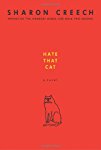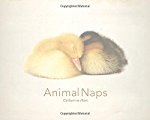I honestly cannot remember a time when I did not love to read. Books have been my dearest of companions since I was a child. I have always loved stories and the characters that inhabit them, but it wasn't until I was in school that I really understood the power of words. One of my teachers read Martin Luther King's I have a Dream speech to us and I was bowled over by it. Today's poetry book explores the idea that words and the ideas they impart can really change a person. In this case a boy learns to change his mind about something, and he also starts to understand that words, either spoke or read, can build connections between people.
 Hate that cat
Hate that cat
Sharon Creech
Poetry
For ages 8 to 12
HarperCollins, 2008, 978-0-06-143092-3
Another school year has started and Jack is once more in
Miss Stretchberry’s class and once again they are exploring poetry. Last year
Jack wrote some amazing poems about his dog Sky, who was killed by a car. Miss
Stretchberry asks Jack if he has any more Sky poems to share but he doesn’t. He
has no more Sky poems in him, though he thinks he could write about a cat, a
“crazy mean fat black cat.”
Jack mentions
that his uncle Bill does not think that the poems Jack has written thus far are
proper poems because they have no rhyme, a regular meter, symbols, metaphors,
alliteration, onomatopoeia, and all the other things that uncle Bill thinks a
poem should have. Hearing this makes Jack want to “punch” his uncle.
Luckily, Miss
Stretchberry has a more enlightened view of what constitutes a poem, and
knowing that she is on his side makes Jack feel a lot better. Mind you, she
does get her students to explore what alliteration and onomatopoeia are, and
Jack starts to enjoy the process. He creates a poem in homage to one that was
written by Edgar Allen Poe, and in his poem he uses lots of sound words.
Exploring what onomatopoeia can do for a poem makes Jack wonder what it would
be like to read a poem that is full of sound words if you could not hear. How
would you perceive a yip, a squeak, and a buzz if you could not hear them?
Thanks to a cat
that lives in his neighborhood, the “mean” cat, Jack does not like cats, but he
does enjoy studying a poem about cats. Then Miss Stretchberry brings in her
kittens, and Jack cannot help feeling that they are “fantastically funny.” He
insists that he would not like one though because kittens grow into cats and
cats are “creepy.” We then find out why Jack hates cats. He tried to rescue one
and got clawed for his pains.
As he continues
to explore poems, Jack finds out that many people like cats. Even his hero, the
author Walter Dean Myers, has a soft spot for felines. In spite of himself,
Jack’s anti-cat feelings begin to soften round the edges. Maybe just a little.
When Jack’s parents give him a kitten for Christmas he softens completely.
As the days
unfold Jack dives into exploring more and more poems. Poems about cats, of
course, and poems that have stories, and sounds, and so much more. What he
never expects is that the glorious words in poems will help him build a new
bridge between himself and his mother; his loving mother who cannot hear words
at all.
This remarkable
book takes us through a young boy’s year, a year full of exploration,
discovery, and new beginnings. We see as his eyes are opened to so many new
possibilities as he learns to love cats, to connect with his mother in new
ways, and to appreciate fully the glory of the written word.
 Last Stop on Market Street
Last Stop on Market Street






